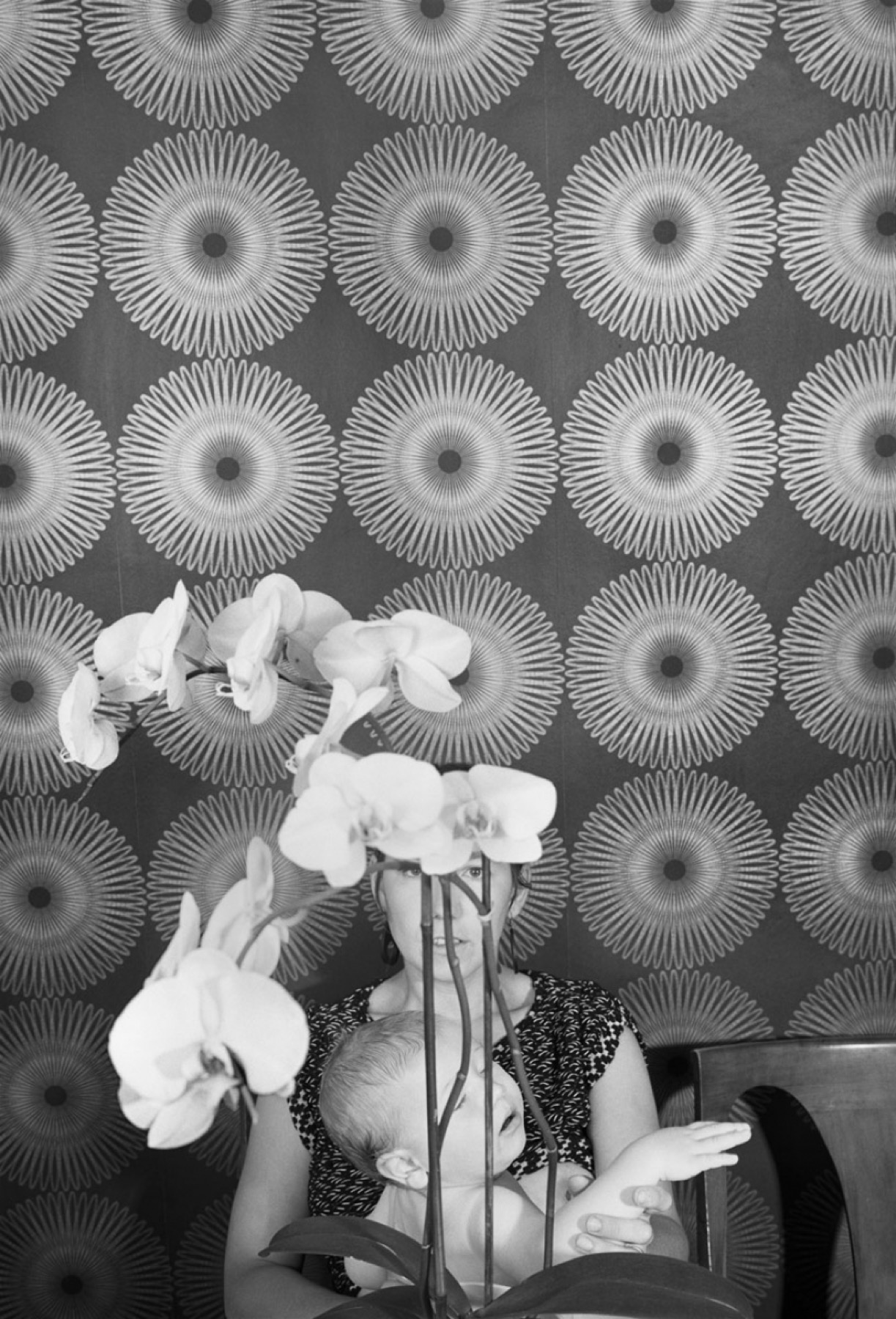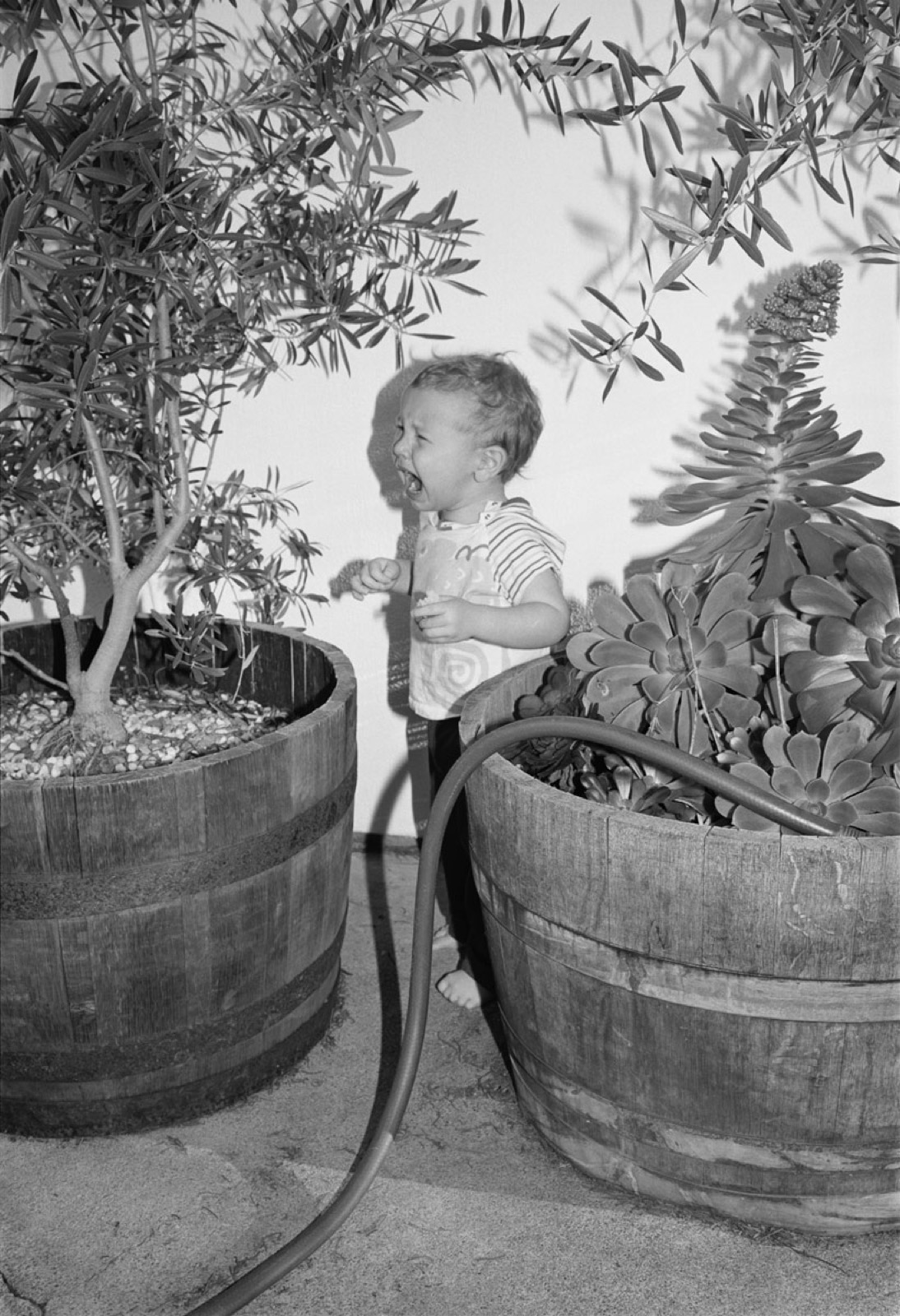You Call That Wild
By Marianne Jay Erhardt

“Orchids” (2014), by Josh Smith. From The First Years, published by Dark Spring Press
for Max’s mother in Maurice Sendak’s Where the Wild Things Are
T
he sailboats of imagination only float so far. When your Max settles into his, surrenders to the sea, in and out of weeks, he is nowhere new. His boat is any boat. The sea holds the usual salt. The Wild Things move with predictable limbs. One has feet that are pale, hairless, human. Their teeth are terrible. Their claws are terrible. The roars that they, well, roar, also terrible. Their rumpus is nothing more than climb, carry, swing. You call that Wild? I want to say. You call those Things?
As for Max, he is no Thing King. See the seams of his costume, the thread of his storybook spine? Even when his walls dissolve into branches and his bed is swallowed by vines, his wolf suit stays a suit. As constant as the moon, the buttons row down his belly. He can fasten them, but he wants you to. He won’t tell you.
I think of my three-year-old boy at the college football game. We sit on the crowded lawn, Nolan in my lap. His nails are already bitten to the quick, but he is worried, giddy and cuts crescent moons into my arm nonetheless. This is how he takes the rush, impact, pom-poms, and ponytails. He swoons; he draws blood.
Later, at bath time, he tells me, “Mama. I am a costume. I am a mascot. I have someone inside of me.”
A wolf suit. A boy suit. The belly button memory of a mama tether. An odd stone to mark the buried time capsule of your before body. Did your husband wince when it was time to cut the cord? Did you do it yourself, scissors in your weak hand, slick with blood? Was it easy to split, to be so undone? When you shift now in the night, does your hand find your belly, that soft ridgeline from sternum to navel? Does it feel like quicksand, your mother costume, and does it suit you?
Milk ducts fill and drain. Hips widen beyond belief. We search for thick skeleton keys in our pockets but we have no pockets, and no treasure chests to worry open anyhow. We have breath grown loud as the shore. We have blue veins blooming, nonsense maps on the backs of our knees. In the water, relief. We are limber to the point of danger. Our new joints marry wonder and shame, thing and name.
Look. You made him that hairy costume. You hung his art at the bottom of the stairs. You are teaching him the distance between Max and By Max. Maybe not fast enough. Maybe too fast. He builds a fort. He nooses a stuffed bear. He cracks a wall. He runs with a fork, insatiable.
The youngest children learn things that fit in their mouths. This is why they try to grab the fat silver grape of the moon. This is why, by the sea, they keep licking the salt and sand from their fingers. And though they want their mothers whole, we only fit a bit at a time. And it hurts. When sleep is a lost runaway, when your nipples have turned to pulp and your baby shows no dissatisfaction with the taste of your blood in his mouth, you say, He is killing me. Meal by meal, I am disappearing into him.
Maybe this is why we are rarely named in children’s stories. “Mother” is like mouth, leg, memory. A limb of the kid, pointless on its own. What name would you choose for yourself? Would you glue it on, belt it on, grow into it? Would you loop it on loose with a wild vine? See if it chokes? Names are hard, people would say to me during my pregnancies. What they meant was stories don’t budge. Once told, just try and shake them off. My little Silas—“of the woods”—stares into storybooks. He is preoccupied with his inability to reach into a picture and pluck a person, dinosaur, strawberry, ocean from its pages. He worries for their freedom. “Stuck,” he says. “Get them out.”
Silas is the one I call rascal, wild child, fearless. Not quite two, he climbs the tricky trees. Other mothers chide me at the park when they see him risk such heights. But even when he falls he is nimble. He floats, rolls, scurries off to some new exciting danger.
Nolan—“noble”—I tell my friends, is sweet, curious, cautious. He wants his feet on the ground. At the dinner table he stands on one leg, leaning on his chair. He won’t go on a swing unless his feet can touch the mulch. As a baby, he refused to ride in a grocery cart or float in water. When we snuggle in bed, he presses the soles of his feet into my thigh. When he was a baby, it was my belly. But he has grown taller, and we line up differently now.
Why fixate on these stories, instead of others? Why not single out the times my grounded boy rises above it all? Why not describe Nolan as the boy who leaps between blue tiles at the grocery store? The boy who forgives too fast? And why not say how Silas announces he loves me, unsolicited, several times per day? Why not say that his body is brave but he worries, every time I put on the mask of my sunglasses, that I am leaving without him? That I am someone else?
 “Olive Trees” (2016) by Josh Smith. From The First Years, published by Dark Spring Press
“Olive Trees” (2016) by Josh Smith. From The First Years, published by Dark Spring Press
When, friend, did you cave and bring Max his supper? Or had you planned to all along? Did you spend his punishment fretting, too lax or too stern? Did you skip supper yourself, go for a run, enjoy your own hunger, lick your lips as you zeroed in on the end of it, the relief there before you even got to the relief? Because the shout was out, the door was slammed; the two of you a pair. Wild insofar as wolves are wild. Still of this world.
We know wolves as villains. Tricking Little Red, donning Grandma’s pajamas, huffing and puffing enough wind to knock down a dwelling. But their reputation is unfounded. Who doesn’t long to roam and hunt? Who doesn’t scale fences for livestock when their wild is abbreviated, their pack at stake? Who doesn’t lie a little bit about who they are, to fit into or flee their family? Wolves, after all, raise humans as their own.
My mother’s name is Janet—Jay—and she doesn’t belong here. She says so herself one winter. I have traveled a thousand miles to visit, but there is no fanfare. We’re not the kind to crown each other for showing up. We sit in the dining room, a high-ceilinged addition to our little ranch house, dreamed up by my mother and erected the summer I was born. I ask her to name her favorite room in the house, thinking we are in it. Without a blink, she answers, the pink bathroom. It’s the warmest room in the house. The one with the lesser, dusty bathtub reserved for hanging wet bras and swimsuits. The closed hamper in front of the toilet, packed with forgotten dirty towels and topped with stacked Penny Savers and church bulletins. The countertop with a sprig of fake flowers that I assembled twenty years ago. The pink bathroom is her favorite, she says, but even so: “I’ve never really felt at home here.” I think she means the house, but she means all of it. “I’m really looking forward to the next life.” She looks up to Heaven. I look up, too. See the ceiling fan where a shredded Mylar balloon glinted for most of my childhood. Cathedral, mom calls this ceiling. See the knots in the pine, shifting faces. Here and there, through the years, she floated the name Great Room, but it never took. Mom looks at me. She can’t wait for this place to crumble.
Or: She splits like a mother has to split. Knows she is boat-bound and water-logged. Knows the daily disappearance. Knows that we’re never thrown to the wolves. We jump. And they’re practice wolves, anyway—gaps in the fur, failing seams where the sea air will rush, rush.
The hope, of course, is for more of the same. New walls and moons and bodies. The hope and the fear is that we will never know what to call it. For your Max, there is only one Wild Thing that seems to trouble him. She is a sea creature, rising from under the surface, close to shore. In many ways, she’s like all the others in the story. Muted colors, claws, terrible, terrible. But her lower body is a mystery, zipped up in the water. Max frowns, lifts his wolf paws to mirror the Thing. She could be kind. She could be killer. And she knows the way home.
Enjoy this story? Subscribe to the Oxford American.


